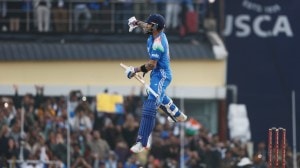Will choose Indias values over Chinas GDP,says PM
In what is clearly among the most candid assessments on China from the Indian leadership,Prime Minister Manmohan Singh on Monday...
In what is clearly among the most candid assessments on China from the Indian leadership,Prime Minister Manmohan Singh on Monday conceded that there was some amount of assertiveness from the neighbouring country for which he did not have any ready answers,but did believe that engagement was still the best way forward. He also sought to reach out to Washington as a more reliable partner.
Highlighting fundamental differences between India and China,particularly in understanding economic growth,Singh said there was more to growth than just GDP and,perhaps,made one of the boldest remarks when he termed reforms in China as one introduced by the writ of a ruling group in a non-democratic set-up.
Interacting with members of the Council on Foreign Relations,an unusually forthcoming Singh sought to underline Indias distinctiveness while fielding queries on Chinas rise and US President Barack Obamas recent visit there.
When asked about Obamas China visit and the reference to India in the joint statement,he said: What happens between President Obama and President Hu is not of any direct concern to us. We want the world to prepare for the peaceful rise of China as a major power. So engagement is the right strategy for both India and the US… but we have long-standing border problems with China which we are trying to resolve through dialogue. Meanwhile,both countries have agreed that pending resolution of the problem,peace and tranquility will be maintained on the border. I have received these assurances from the highest levels,but there is still a certain amount of assertiveness on the part of China. I dont fully understand the reasons for it,but that has to be taken note of.
Singh was clearly attempting to project India as a more natural partner for the US and that was best emphasised while he took a question on comparing Indias economic growth with that of Chinas. There is no doubt that Chinese growth is superior to Indias growth performance. But I always believe there are other values which are more important than just the growth of GDP. Respect for human rights,respect for rule of law,respect for multi-cultural society,ethnic and religious rights,these have value also. There are several dimensions to human freedom which are not always caught by GDP. So even though Indian performance with regard to GDP might not be as good as the Chinese,I would not like to choose the Chinese path. I would stick by the Indian path.
Elaborating further,he said: India seems to sometimes appear as an indecisive democracy but I always believe that once a democracy decides on the basis of wide ranging consensus,any reforms that are undertaken will be far more durable and effective than reforms introduced by the writ of a ruling group in a non-democratic set-up.
While pointing out the differences with China served the purpose of showing up India as a more trusted partner,Singh backed Obamas dialogue-based approach with Iran. He made it clear that India did not favour Iran acquiring nuclear weapons as it was inconsistent with the Non-Proliferation Treaty of which it was a member.
Recalling his recent interaction with Iranian Foreign Minister Manouchehr Mottaki in New Delhi,Singh said he was told Tehran is now more hopeful with Obamas approach. When asked if India would support an US move for sanctions against Iran,he replied: We have so far abided with all UNSC resolutions.


- 01
- 02
- 03
- 04
- 05





























